- Home
- Micheal Maxwell
East of the Jordan (A Logan Connor Thriller Book 2) Page 11
East of the Jordan (A Logan Connor Thriller Book 2) Read online
Page 11
CHAPTER ELEVEN
The royal palace of Jordan rose out of the city of Amman like a relic of the ancient world set into the middle of a modern city. The structure was built as a massive cube with parapets sticking out of each corner. The wall rose like a piece of the old world. It only lacked archers and crossbowmen sitting in the shooting windows and watching the killing field. Instead of crossbows and recurve bows, serious young men in camouflage stood outside the walls holding American-made M-16s. As with just about any military member assigned to duty, they were a mixture of the serious and the bored. They could pull their rifles to their shoulders and send thousands of rounds downrange at a moment’s notice, or they could pull their hats down over their eyes and take a nap.
Abu Kishaa, Sydney, and three Brothers walked up to the front of the palace. Abu Kishaa wore his standard linen pants and a linen shirt with no shoes. For the first time in six months, Sydney wore her normal clothes. Well, they were clothes she might wear in the Western world. Her actual daily clothes were a pair of jeans, Converse shoes, and an F.C. Copenhagen soccer t-shirt. Today, she wore a black pencil skirt, black pumps, and a black blouse. Out of respect for the Jordanians, she wore a black hijab over her hair. Sydney convinced Abu Kishaa she needed to dress like she wasn’t just walking out of the desert. Mostly, she was just tired of walking around in linen. The Brothers wore their usual outfits along with their ceremonial scimitars. They’d left their rifles in the Jeep.
A door to the palace wall opened. A man wearing a military dress uniform strode out of the gate with a stream of other officers coming in tight formation behind him. The man in the lead wore racks and racks of ribbons on his chest that glimmered like jewels.
What war has Jordan won recently that this guy gets a chest full of medals?
She leaned over to Abu Kishaa and whispered, “That’s Major General Khaled Majali, chairman of the Joint Chiefs. He’s the highest-ranking military officer in Jordan.”
Abu Kishaa nodded. She figured he didn’t know that before. Maybe that’s why I’m here.
The general walked up to Abu Kishaa, and Kishaa extended his hand for a handshake. The general scowled and crossed his arms. Abu Kishaa just grinned and retracted his hand.
Abu Kishaa said, “A salaamu alaikum.”
The major general replied, “Wa Alaikum salaam.” Then, he looked at Sydney and spoke in English. “Good morning.”
Sydney replied, “I speak Arabic.”
The general frowned at her. “Good for you.” After a moment, the general turned on his heels and began to walk. As he stepped away, he said, “The king will see you now.”
He walked with the quick pace of an impatient man.
The general led them through a series of doors and up several staircases. They walked for what felt like an hour. Abu Kishaa’s bare feet squeaked against the marble of the floor. Eventually, they reached a pair of double doors that were at least twenty feet tall. Everything over their heads, on the walls, and under their feet was made of marble and gold. Gold spread across every flat surface, scrolling and dripping as if it was poured like a liquid.
The general knocked once on the door and then yanked; the door slid open with resistance. The King sat on a massive throne. It was straight-backed with red plush cushions and outlined in gold. Sydney knew that he typically sat in an ordinary office chair at a desk. A throne seemed a little bit medieval for a 21st-century king. But this was all for show. Then again, a prophet walking out of the desert probably belonged in the ancient world too.
The general stood next to the throne and proclaimed, “His Majesty, the King of the Hashemite Kingdom of Jordan.”
After a pause, the general proclaimed, “Presenting Abu Kishaa, the self-proclaimed prophet of the god Chemosh.”
One of the soldiers standing next to the king stood with a silver platter in his hands. Another soldier picked up a teacup and a pot of hot water. He placed a teabag in the cup and poured hot water over it. He took the steaming teacup to the King.
Abu Kishaa smirked at the slight.
The King casually drank his tea. When Abu Kishaa approached the throne, the King sat up straighter. The general took half a step forward. Kishaa got close enough that he could speak in a carefully modulated voice. Everyone paused as he stood there. The guards carrying M-16s moved their hands to their rifles.
Abu Kishaa sat down on the floor at the King’s feet and crossed his legs. “Tell me, Your Highness, what do you most want in this world?”
Everyone relaxed. The King sat back. The general sighed. The guards moved their hands away from their triggers.
The King drummed his fingertips together. “I have only ever sought to serve my God and my country.”
Abu Kishaa nodded. “For God and country, a common desire. Much like in your Quran, when God says to David, ‘O, David! Verily we have placed you as a successor (Khalifa) on the earth, so judge between men with truth and justice.’”
The King nodded. “You know your Quran.”
Kishaa smirked. “Even the Devil can quote scripture for his own ends.”
The King laughed and clapped his hands. “You know your Bible as well.”
Abu Kishaa nodded. “I must know all of the words of the false prophets that I might put the lie to their teachings.”
The King’s expression turned dark, and he leaned forward. “Be careful who you call a liar.”
“I can give you what you seek, Your Highness. I can empower you to serve God and your country.”
The King narrowed his eyes, “What can you give me that Allah has not already given me?”
Abu Kishaa held out his open hand with his palm up. He held his breath for a moment and then said, “Fire that burns in the hearts of your citizens.”
The King gasped. He recoiled backward on his throne, almost spilling his tea. His mouth fell open, and he stared at Abu Kishaa’s empty palm.
“Amazing,” the King whispered.
What’s amazing? Sydney wondered.
The King sipped the tea again. “Even the false prophets of old could do what seemed like miraculous tricks, though. Even Pharaoh’s magicians displayed amazing wonders.”
“These are not mere tricks. Chemosh has given me the power to perform wonders that you might believe me.”
The King held out his teacup. A soldier rushed over to fill it. The king said to the soldier, “Where is my daughter? Bring her here.”
The soldier poured more hot water into the teacup. The King sipped it again. “What tea is this? I haven’t tasted it before.”
The soldier said, “Your highness, that is the tea Abu Kishaa sent as a gift.” The soldier rushed away.
The king smiled. “The tea is delicious. Thank you.”
Kishaa nodded. Then he said, “In the days of Moses and Aaron, the Israelites wandered on the other side of the Jordan River. But here, East of the Jordan, lived the Moabites. You and I are descended from these people. The Moabites believed in Chemosh. They possessed great wealth and prosperity, but their wealth made them arrogant. They believed they did not need a Creator and sought to be Creators themselves. They made for themselves idols. They made shrines to false gods and worshipped the things they made. Because of their disobedience, Chemosh delivered them to the Israelites. They were driven under. Many fled but many more converted to the cult of Yahweh. For 3,500 years, the Moabites were punished.”
“That’s a long time,” the king offered.
Abu Kishaa shook his head, “To the creator of all things, it is not even a blink of an eye. They were punished for 3,500 years, but Chemosh has chosen this moment to make Himself known again.”
“Why now?” The King asked.
“Because the hour of judgment is near. Chemosh has decided to end the world soon. I have begged him on bended knee to give me the time to save as many souls as can be saved. That is why I am here. I am here to beg you, Your Highness, to help me save the people of Jordan. I come first to the Descendants of the Moabites.”
Sydney needed to continually remind herself this was all so much claptrap. She was never able to determine to what extent Kishaa believed all of his nonsense about Chemosh, but she knew for a fact his primary motivation was selling the drugs he was cooking up in the desert.
The King listened to this for a moment and considered it. Then, he said, “The Quran says the moon will split when the hour is at hand.” He smirked. “I have seen no splitting.”
Before Abu Kishaa could respond, the King’s daughter walked in. The princess wore a white dress tucked at the waist that then ballooned out like a bell. She wore a waist-length cardigan over the dress. Her hair was blonde with dark roots and fell in waves on her shoulders. She looked to be older than twenty but younger than thirty. She was strikingly beautiful.
She walked in and kissed her father on the cheek. He whispered something to her. Then he announced, “This is my eldest daughter, Princess Ilham.”
She stepped forward and held out a hand to Sydney. “It is nice to meet you, Queen of Chemosh.”
Sydney shook her hand.
Ugh. Is that what I am? The Queen of Chemosh?
She shook Abu Kishaa’s hand. He pulled her hand to his mouth and kissed the back.
“You are as beautiful as the sun setting over the Jordan River. Perhaps, you would come to my camp and watch it with me.”
The princess giggled and blushed red. She brushed her hair behind her ear. “I’d like that.” She paused, then added, “If my father will allow it.”
The King frowned, “Some men grow greedy for money. Some for wives.”
Kishaa smiled, “You want to see the moon split? Allow your daughter to come to my camp. Send as many of your guards as you please. I will split the moon, and she will be my witness.”
The King growled, “Blasphemy!”
Abu Kishaa responded, “Only if I cannot do it.” He then said, “Tomorrow night, I will split the moon asunder, and you will see that Chemosh is the one true God.”
He smiled at Princess Ilham. She blushed again. Sydney felt a flash of something she couldn’t identify at first. Then, she shuddered with nausea when she realized what it was: jealousy.
Abu Kishaa strode out of the King’s throne room. Sydney slid next to him and whispered, “Did you put Qedex in his tea?”
Abu Kishaa smiled. “It can aid non-believers in seeing the truth.”
* * *
Logan closed his eyes and visualized the paper Abu Kishaa gave him with the list of names on it. The third name on the list was Muhammad Bin Mehmed in Galway. It was a common enough name. If he were going to the Arab world or even to England, it would be nearly impossible to find this man quickly. However, he was headed to County Galway, Ireland. There could only be so many Muhammads there.
As the sun rose over Syria, Logan was on a plane out of the country. Finding an aircraft was easy enough. He bought an old Piper Cub at a rugged airfield near the border. He paid almost twice the plane’s actual value to speed up the sale, which would probably set off red flags. But he needed to fly below the radar to avoid too much attention. The small plane was just the thing.
The plane was an old model from the early 1970s. It could fly about 400 miles before he would need to refuel it. Logan flew a meandering and indirect route just in case he was reported to the militia.
He fueled it up when he bought it and set out from Syria. He landed twice in Turkey to refuel. The second small airport was out of aviation fuel. So, he purchased 93 octane automobile gasoline at a gas station just down the road. Logan lugged two five-gallon gas cans back to the airport that he promised to leave with the man at the hanger. After drinking a barely cool Coke, he made a second and third trip to the gas station. The back and forth trips to roadside gas stations took him two hours and left his arms feeling like rubber.
He poured a bottle of octane booster in the tank he found in the plane’s storage compartment. It was pointless. As he flew out of Turkey, the engine knocked and sputtered as the lower octane fuel exploded randomly. He would burn up the valves and probably crack a head somewhere along the way. The plane just wasn’t rated for that kind of fuel. He just hoped it would get him into Europe. If he could get to Europe, he could use a fake passport to travel freely through the EU. He just needed the engine not to conk out midair.
The plane held up, but just barely. By the time Logan approached the coastline of Greece, the engine was misfiring and sputtering. Oily, white smoke billowed out from behind the propeller. The plane was burning oil, probably from a cracked seal. He set down on a long stretch of stony beach somewhere on the Aegean Sea as the sun was going down.
Smoke kept pouring out of the plane after he’d turned the engines off. He hopped out and left it where it sadly died. Hopefully, some Greek mechanic would get it running again, but he would need the luck of Zorba and the smarts of Plato.
How many planes had he left in fields to die? By his count, he was up to four, but he was probably forgetting one.
He headed for the nearest lights. He needed a train ticket.
* * *
Logan took a train from Greece into Bulgaria. He went through Romania, Hungary, and Austria and into Germany, then across France, and on to England. The entire trip took three full days. He made a few detours and backtracked stops along the way, but he was sure no one was tracking him by this point.
He rented a car outside of London and drove to Liverpool. In Liverpool, he took a ferry to Belfast. He rented another vehicle in a small town in Northern Ireland and drove it to Dublin. He returned it and rented another one to go from Dublin to Galway. All in all, another two days.
By the time he parked the car outside of a Galway Pub, a week had passed since Eric attacked him in Syria. He felt like he was a world away from the Middle East. In Syria, the weather was hot and dry with a constant gritty wind. In Galway, the air was wet and cool. He walked a few doors down from the pub and bought a waterproof coat.
Feeling more prepared for the Gaelic weather, he walked into the pub named Ri Na hEireann. Since when don’t they speak English in Ireland?
Logan made a mental note to start studying more languages. He thought he was pretty good with them, but this recent gallivanting proved he was way out of his element.
He strolled through the pub, listening to pieces of conversation. Most of them were in English, which was refreshing, but the occasional conversation was in some other language. It was breathy and melodic. Gaelic?
Logan sat down at the bar. The bartender walked over, wiped down the bar quickly, and set down a napkin.
“Cad ba mhaith leat?” He asked.
Logan groaned. “What is that? Gaelic?”
The bartender squinted at him. “You’re in Ireland, my friend. It’s Irish.”
Logan nodded. Of course. “I thought that was a dead language.”
The bartender replied, “Those are fighting words. You’re in the Gaeltacht now.”
Logan replied, “Where they speak Gaelic?”
The bartender groaned. “In English, we call it Irish. In Irish, we call it Gaelic.”
That didn’t clear up much.
Logan decided to just press forward. “My sister is getting married. I’m trying to figure out where she’s registered.”
“Where’s the wedding?” The bartender asked.
Logan shrugged. “She told me the name of the venue, but it’s in Gaelic. I mean, Irish. She’s marrying some guy named Bin Mehmed.” Logan paused and then added, “A pint of Guinness, please.”
The bartender rolled his eyes. “You know, we have more than Guinness here.”
He pulled a pint of black beer from the tap and set it down. The foamy head sloshed over the side of the glass like in the commercials.
“Galway is a big place,” He replied. “Lots of Asian folks working at GMIT, though. At University?”
“Right,” Logan said, nodding. “She said he worked at a college.”
Logan finished his beer, paid, and headed out the door. He found a
mobile phone shop in the next block and bought the cheapest phone he could find. He googled Bin Mehmed and GMIT.
On the Galway-Mayo Institute of Technology faculty was Professor Muhammad Bin Mehmed, who taught history at the Mayo campus.
He ordered an Uber. He just hoped he was still a better spy than Eric. If he weren’t, he would probably find the cold body of Professor Muhammad Bin Mehmed.
CHAPTER TWELVE
The Galway-Mayo Institute for Technology was about 45 minutes outside of Galway. The campus in Castlebar greeted Logan with a building that looked something like an aircraft carrier made out of solar panels. The futuristic angular building rose out of a grassy lawn as green as everything else in Ireland. He parked the rented car in a space marked Faculty.
Logan carried a coffee and a book from the Student Co-op to fit in with the students as he headed to the History building. It was the middle of the day on a weekday, so college students who should have been in classes seemed to be milling around everywhere. Others hurried across the quad, probably late for class. A third group lounged around the way only failing college students can.
Logan was approaching twenty-five, so he was a little bit older than most of them. He could be where they are, though. Part of him wished he could be there, but he’d sealed his future when he met Titus Crow. There was no going back. Maybe after he dispensed with Abu Kishaa, he could take one of his fake identities that weren’t burned and attend college. Then again, if a piece of Crow’s network could find him in rural Alabama, they could find him on a college campus.
He sighed at what could have been as he approached the History building. He walked through the halls of offices, looking for the right one. No one seemed to bother him. A twenty-something guy wandering around college hallways looking lost was nothing unusual.
Eventually, he found the door for Dr. Muhammad Bin Mehmed. The door was slightly open. He knocked.
An Irish accent responded, “Come in.”
Wasn’t expecting an Irish accent.

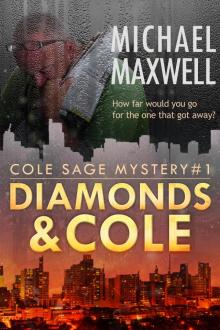 Diamonds and Cole: Cole Sage Mystery #1
Diamonds and Cole: Cole Sage Mystery #1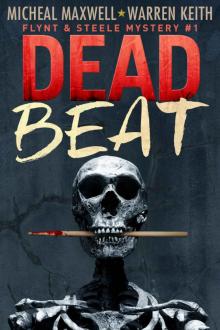 Dead Beat
Dead Beat![[Cole Sage 03.0] Helix of Cole Read online](http://i1.bookreadfree.com/28/cole_sage_03_0_helix_of_cole_preview.jpg) [Cole Sage 03.0] Helix of Cole
[Cole Sage 03.0] Helix of Cole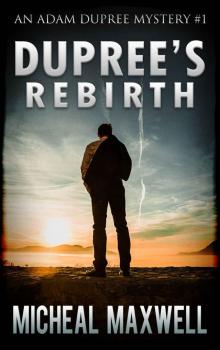 Dupree's Rebirth
Dupree's Rebirth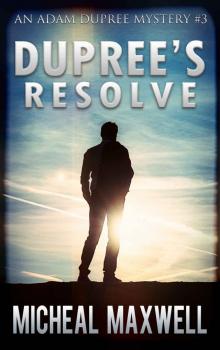 Dupree's Resolve
Dupree's Resolve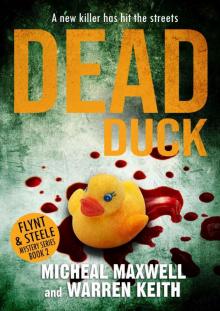 Dead Duck
Dead Duck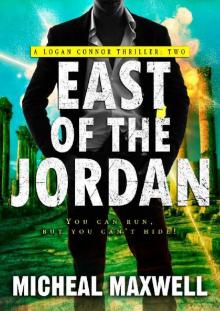 East of the Jordan (A Logan Connor Thriller Book 2)
East of the Jordan (A Logan Connor Thriller Book 2)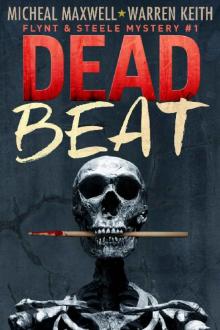 Dead Beat (Flynt and Steele Mystery Book 1)
Dead Beat (Flynt and Steele Mystery Book 1)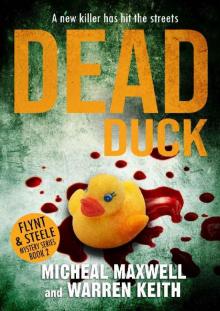 Dead Duck (Flynt & Steele Mysteries Book 2)
Dead Duck (Flynt & Steele Mysteries Book 2)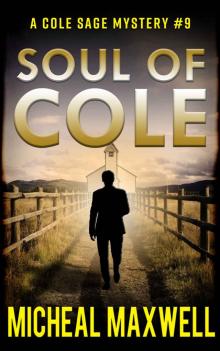 Soul of Cole
Soul of Cole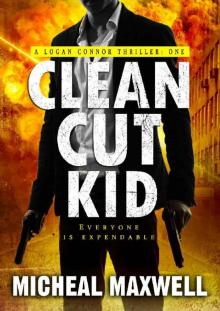 Clean Cut Kid (A Logan Connor Thriller Book 1)
Clean Cut Kid (A Logan Connor Thriller Book 1)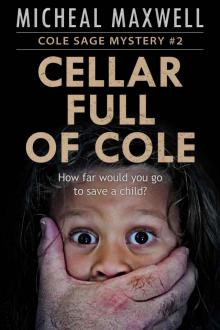 Cellar Full of Cole: A Cole Sage Mystery #2
Cellar Full of Cole: A Cole Sage Mystery #2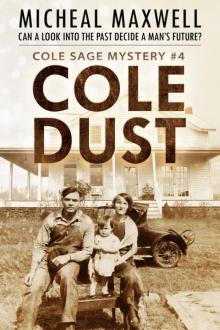 Cole Dust Cole
Cole Dust Cole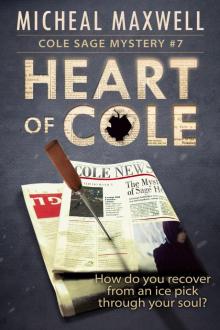 Heart of Cole
Heart of Cole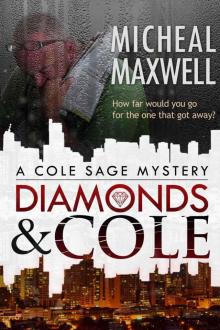 Diamonds and Cole: A Cole Sage Mystery
Diamonds and Cole: A Cole Sage Mystery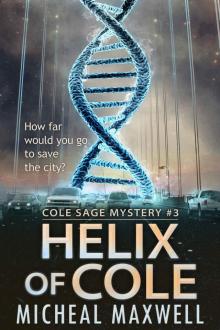 Helix of Cole
Helix of Cole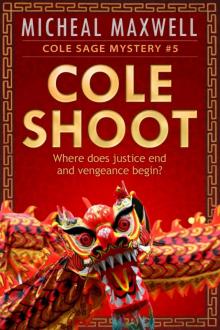 Cole Shoot
Cole Shoot